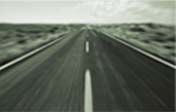TIPS FOR SAFER TOWING
However, it's a good idea for inexperienced drivers to build confidence by booking onto a towing course where they will learn the basics of safe hitching and reversing. These courses are available from caravanning organisations and driver training schools across the country. It's also a good idea to practice basic manoeuvres away from the public road.

Here, we offer the following tips for safer towing:
W is for weight:
You can check the 'Gross Train Weight' (this is the weight of your fully-loaded car plus a fully-loaded trailer) on the car's Vehicle Identification Number (VIN) plate. It's an offence to drive your car if you've exceeded this weight. Make allowances for limited acceleration and longer stopping distances. With a loaded trailer you may not stop as quickly as you are used to, so leave plenty of space.
I is for insurance:
Most car insurance policies cover you for towing a caravan or trailer. However, this will usually only be third party, meaning for example that if your caravan became detached from the car you would be covered for injury to other people or damage to their property, but your own caravan would not be covered. Do also ensure you have appropriate breakdown cover. Most recovery companies won't cover a trailer unless it is specified in your contract.
S is for speed:
Speed limits for vehicles towing trailers are lower than you might be used to if you're not towing. On single-carriageway roads your maximum speed i...


